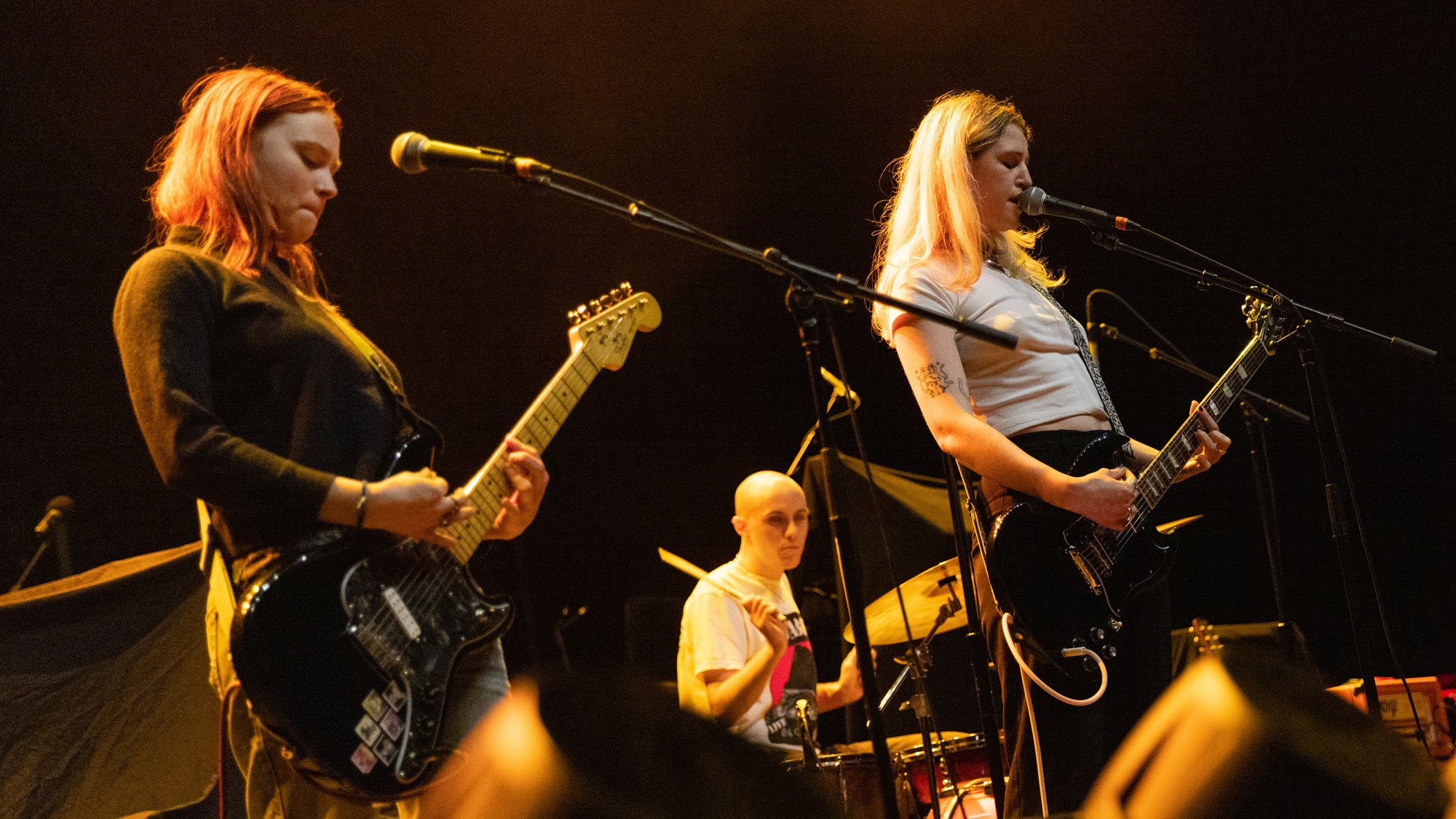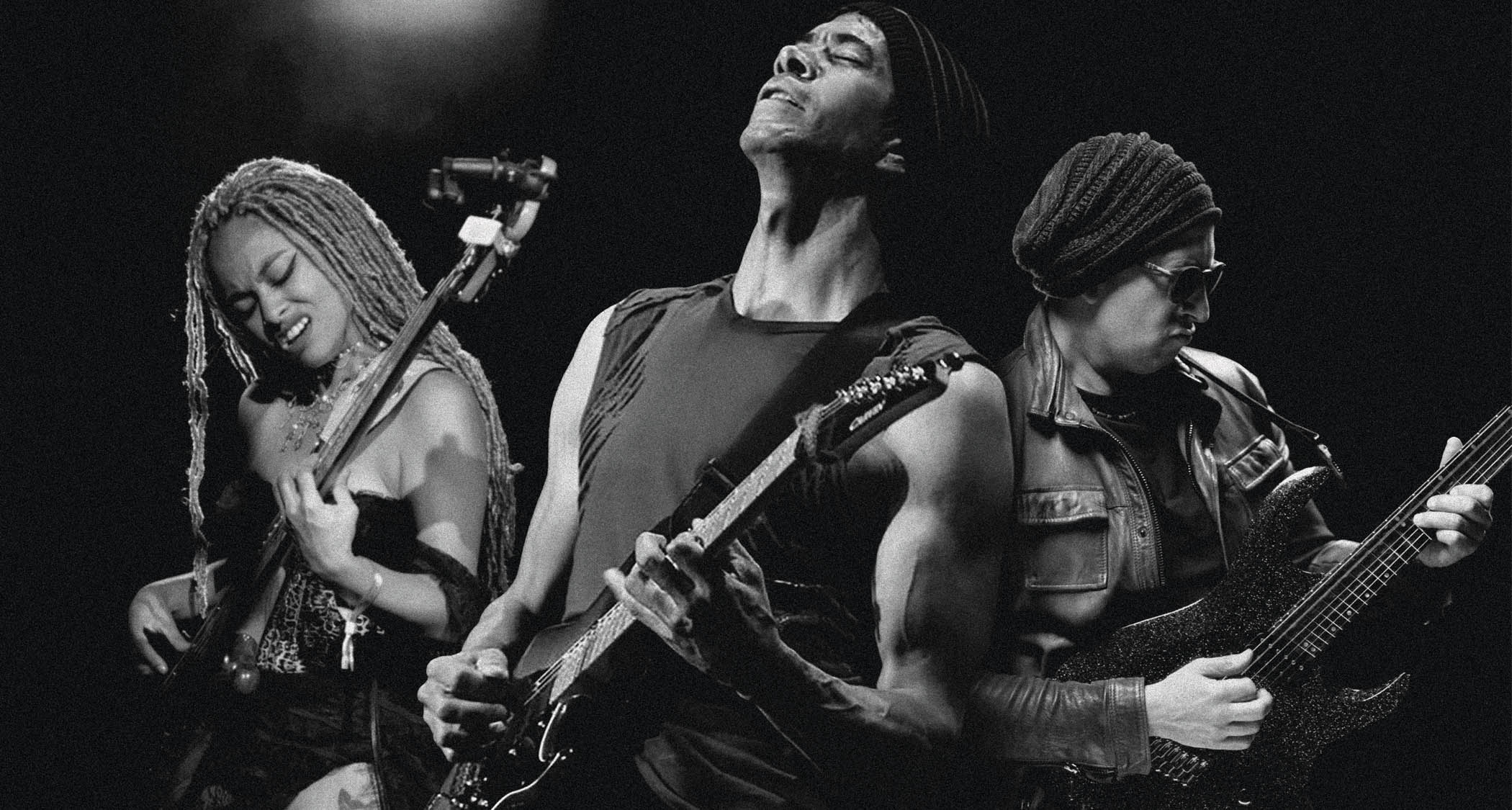“Our riffs are unconventional because we don’t know what key anything is in. Most guitar players wouldn’t admit that”: From Billy Corgan to Big Thief, how Momma became one of alt-rock’s most addictive bands
On album number four, Etta Friedman and Allegra Weingarten find themselves at their most autobiographical, searching deep to channel the music – and employing pedals with secret powers

While most-guitar bands tend to have designated roles in terms of what kind of sonic space their members occupy, Momma six-stringers Etta Friedman and Allegra Weingarten enjoy being unrestricted, fluid and free.
They both write and sing, switching from rhythm to lead, depending on what is required for the song. It’s an easygoing musical partnership born out of the mutual respect that’s come from working together over the past decade, having formed the band at school while in their mid-teens.
That sense of collaboration and cohesion is more than evident on the 12 tracks that make up hook-laden fourth album Welcome to My Blue Sky, which blurs the lines between grunge, dream pop and indie in the most brilliant of ways. By their own admission, it could very well be the secret to their success.
“We’ve always been like this,” says Weingarten, who’s joined by Friedman on a hard-earned day off in the middle of a sold-out tour. “Both of us are good at writing and playing leads, so it would be weird to separate the roles. It also makes things more interesting. If one of us writes a song, we leave space for the other person to contribute melodically. I think we bring out the best in each other.”
What felt different about this album from a guitar standpoint?
Etta Friedman: “We were a lot more simplistic this time round, not to say the parts aren’t interesting. This latest record feels more autobiographical. It’s more about our emotions and our identities.
“We found a lot of the direction through experimentation, using all the crazy pedals that Aron [Kobayashi Ritch, bass/producer] has. That’s why it’s more experimental in places.
All the latest guitar news, interviews, lessons, reviews, deals and more, direct to your inbox!
Billy Corgan is a legend. I got into the Pumpkins a bit later, but they’re influential to us in the sense that they set the standard for how big things can sound
Allegra Weingarten
I Want You (Fever) has an extreme reverse delay and tremolo effect at the beginning and end. How did you get that sound?
Allegra Weingarten: “Most people think it’s a synth, which is wrong. It’s me going into a pedal called the Meris Ottobit. We’re not gearheads, so I can’t tell you what the pedal does. We kept the glitchy loop running, and it became the anchor of the song.”
Friedman: “It somehow automates whatever is happening and creates weird noises in the moment. We had to use the first take from the demo. We couldn’t redo it in the studio; it just wouldn’t have sounded the same.”
There are a lot of influences at play in your music, but from a fuzz and dream pop perspective, there’s definitely a Smashing Pumpkins connection.
Weingarten: “Billy Corgan is a legend. I got into the Pumpkins a bit later, but they’re influential to us in the sense that they set the standard for how big things can sound. I think what makes our band special is how we take mellow influences and put them through the filter of what the Pumpkins sound like live. That’s what Momma is.”
The first guitarist I was encapsulated by was Joan Jett. I was obsessed because she was so cool and fearless
Etta Friedman
Which players got you hooked on guitar early on?
Friedman: “The first guitarist I was encapsulated by was Joan Jett. I was obsessed because she was so cool and fearless. When I got more into the ’90s era, I was looking up to players like Stephen Malkmus [Pavement]. Another big one is Kim Deal, because she’s really innovative and has this interesting rhythmic thing she does. She writes such beautiful songs.”
Weingarten: “Rob Crow is my main influence. I used to sit in my room and learn all those Pinback parts. It’s corny, but Alex G changed acoustic guitar for our generation in such a massive way. Not enough people admit that. I’d never played in drop D [tuning] until I started listening to him.
“Liz Phair is hugely underrated because her chord progressions are really weird and off the map. She doesn’t get enough credit for her awesomeness.”
What kind of gear were you using on this record?
Friedman: “I played Aron’s Les Paul Junior. There were some Fender Jaguars in the studio. I used my Jagstang on Take Me with You, because that’s also in a weird tuning. I was trying to learn a Big Thief song that was in CGDGGD, and then we put a capo on the third fret.”
Weingarten: “We also had a weird EG#BF#BE tuning for New Friend, which I stole from American Football. Being in the studio was a blur; things would get handed to me. I remember they had this Les Paul from the ’80s that I liked.
“I used my Martin X-Series for the acoustic parts, which is funny because it’s a shitty guitar. As for amps, there was every kind of Fender and some Marshalls. For My Old Street we took an old Princeton and turned it all the way up to get a sludgy, dusty vibe.”
And how does that differ from what you use live?
Weingarten: “We both play Fender Deluxe Reverbs because they’re loud and take pedals well. My main guitar is a Gibson SG. I have the little orange [Electro-Harmonix Op Amp] Big Muff, a [Pro Co] Rat and some EarthQuaker Devices pedals – the Westwood for my overdrive, the Grand Orbiter for my phaser and the Hummingbird for my tremolo.”
Friedman: “I’m mainly playing my brother’s humbucker Telecaster. I also have a Jagstang and a Les Paul Junior. For pedals, I use my Tube Screamer, Big Muff, Z.Vex Box of Rock overdrive and Z.Vex Super Hard On boost.”
Last Kiss has a dreamy quality, thanks to all the ninth chords.
Friedman: “We love a ninth chord. Every time I pick up a guitar, I always start with a ninth chord. I probably picked it up from learning Alex G songs. We’re not trained players; we’re self-taught, which I think is essential to our sound. I’ve never played a scale in my life. I don’t know the names of the chords I’m using.”
Weingarten: “Our riffs are unconventional because we don’t know what key anything is in. Most guitar players wouldn’t admit that, but I actually think it’s cool. It keeps the music fresh. We’re not relying on theory to find what’s correct or acceptable. It’s all very intuitive.”
- Welcome to My Blue Sky is out now via Polyvinyl.
- This article first appeared in Guitar World. Subscribe and save.
Amit has been writing for titles like Total Guitar, MusicRadar and Guitar World for over a decade and counts Richie Kotzen, Guthrie Govan and Jeff Beck among his primary influences as a guitar player. He's worked for magazines like Kerrang!, Metal Hammer, Classic Rock, Prog, Record Collector, Planet Rock, Rhythm and Bass Player, as well as newspapers like Metro and The Independent, interviewing everyone from Ozzy Osbourne and Lemmy to Slash and Jimmy Page, and once even traded solos with a member of Slayer on a track released internationally. As a session guitarist, he's played alongside members of Judas Priest and Uriah Heep in London ensemble Metalworks, as well as handled lead guitars for legends like Glen Matlock (Sex Pistols, The Faces) and Stu Hamm (Steve Vai, Joe Satriani, G3).
You must confirm your public display name before commenting
Please logout and then login again, you will then be prompted to enter your display name.


